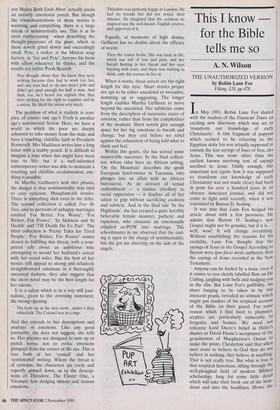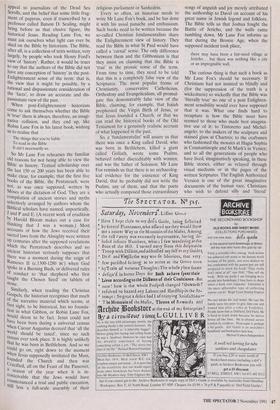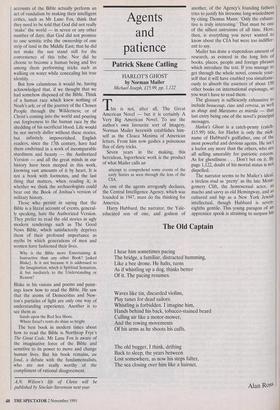This I know for the Bible tells me so
A. N. Wilson
THE UNAUTHORIZED VERSION by Robin Lane Fox Viking, 120, pp.478 In May 1991, Robin Lane Fox shared with the readers of the Financial Times an exciting new discovery which was set to 'transform our knowledge of early Christianity'. A tiny fragment of papyrus which seemed to be referring to the Egyptian deity Isis was actually supposed to contain the lost sayings of Isses or Issa, aka Jesus. This was none other than the earliest known surviving text of sayings ascribed to Jesus. Oddly enough, this important text (quite how it was supposed to transform our knowledge of early Christainity was not made clear) had been in print for over a hundred years in an obscure American journal, and did not come to light until recently, when it was translated by Batson D. Sealing.
It was true that Lane Fox hedged his article about with a few provisoes. He admits that Batson D. Sealing's new Gospel might not be genuine, but if it is... well, wow! It will change everything. Without establishing the reasons for his credulity, Lane Fox thought that the sayings of Jesus in the Gospel According to Batson were ipso facto more authentic than the sayings of Jesus recorded in the New Testament.
Anyone can be fooled by a hoax, even if it comes to you clearly labelled Bats on De Ceiling, jangling with bells and nudging you in the ribs. But Lane Fox's gullibility, his sheer longing to be taken in by this innocent prank, revealed an attitude which might put readers of his sceptical account of the Bible on their guard. For some reason which I find hard to plummet, sceptics are particularly vulnerable to forgeries and hoaxes. We need not rehearse Lord Dacre's belief in Hitler's diaries or David Hume's acceptance of the genuineness of Macpherson's Ossian to make the point. Chesterton said that when men cease to believe in God they do riot believe in nothing, they believe in anything. That is not really true. But what is true Is that sceptical historians, sifting through the well-ploughed field of modern Biblical scholarship, long for some little detail which will take their book out of the hum- drum and into the headlines. Hence the
appeal to journalists of the Dead Sea Scrolls, and the belief that some little frag- ment of papyrus, even if transcribed by a Professor called Batson D. Sealing, might bring before us that elusive figure, the historical Jesus. Reading Lane Fox, we must ask ourselves what light can ever be shed on the Bible by historians. The Bible, after all, is a collection of texts written, very largely, by people who took Henry Ford's view of 'history'. Rather, it would be truer to say that the authors of the Bible did not have any conception of 'history' in the post- Enlightenment sense of the term: that is, the view that it might be possible, by a rational and dispassionate consideration of the 'facts', to draw an accurate and dis- passionate view of the past. When post-Enlightenment historians come to ask themselves whether the Bible IS 'true' there is always, therefore, an imagi- native collision, and they end up, like Robin Lane Fox in his latest book, wishing us to realise that The things that you're liable To read in the Bible It ain't necessarily so.
So Mr Lane Fox rehearses the familiar old reasons for not being able to view the Bible as history. Textual scholarship over the last 150 or 200 years has been able to make clear, for example, that the first five books of the Bible, the Pentateuch, were not, as was once supposed, written by Moses at the dictation of God. They are a Compilation of ancient stories and myths selectively arranged by authors whom the Biblical scholars have named, unpoetically,
and P and E. (A recent work of erudition by Harold Bloom makes out a case for thinking that J was a woman.) Most accounts of how the Jews received their sacred laws from the Almighty were written LIP .centuries after the supposed revelations which the Pentateuch describes and no ancient historian seriously supposes that there was a moment during the reign of Rameses II (c.1300-1280 BC) when God Spoke in a Burning Bush, or delivered rules of conduct to `that shepherd who first taught the Chosen Seed' on tablets of stone.
Similarly, when reading the Christian Gospels, the historian recognises that much of the narrative material which seems, at first sight, to be historical, has no founda- tion in what Gibbon, or Robin Lane Fox, Would deem to be fact. Jesus could not have been born during a universal census When Caesar Augustus decreed that 'all the world should be taxed', since no such census ever took place. It is highly unlikely that he was born in Bethlehem. And so we could go on, right down to the moment when Jesus supposedly instituted the Mass, founded the Church and then was Crucified, all on the Feast of the Passover, a season of the year when it is in- conceivable that the Jews would have cOuntenanced a trial and public execution, Still less a full-scale assembly of their
religious parliament or Sanhedrin.
Every so often, an historian needs to write Mr Lane Fox's book, and he has done it with his usual panache and enthusiasm. Such books need to be written because the so-called Christian fundamentalists share the Enlightenment view of history. They read the Bible in what St Paul would have called a 'carnal' sense. The only difference between them and the Gibbonians is that they insist on claiming that the Bible is `true' in the prosaic sense of the term. From time to time, they need to be told that this is a completely false view of the Scriptures. The most popular forms of Christianity, conservative Catholicism, Orthodoxy and Evangelicalism, all promul- gate this demonstrably false view of the Bible, claiming, for example, that Isaiah prophesied the Virgin Birth of Jesus, or that Jesus founded a Church, or that we can read the historical books of the Old Testament for a genuinely realistic account of what happened in the past.
So, a 'fundamentalist' will assure us that there was once a King called David, who was born in Bethlehem, killed a giant called Goliath, wrote some Psalms, behaved rather discreditably with women, and was the father of Solomon. Mr Lane Fox reminds us that there is no archaeolog- ical evidence for the existence of King David, that he probably did not write the Psalms, any of them, and that the poets who actually composed those extraordinary songs of anguish and joy merely attributed the authorship to David on account of his great name in Jewish legend and folklore. The Bible tells us that Joshua fought the Battle of Jericho, and the walls came tumbling down. Mr Lane Fox informs us that during the Bronze Age, when the supposed incident took place, there may have been a fair-sized village at Jericho... but there was nothing like a city or an impregnable wall.
The curious thing is that such a book as Mr Lane Fox's should be necessary. If Christians had not insisted so blindly and (for the suppression of the truth is a wickedness) so wickedly that the Bible was 'literally true' no one of a post Enlighten- ment sensibility would ever have supposed that it was. What one finds hard to recapture is how the Bible must have seemed to those who made best imagina- tive use of it: to Tintoretto and Michel- angelo; to the makers of the sculpture and stained glass at Chartres; to the craftsmen who fashioned the mosaics at Hagia Sophia in Constantinople and St Mark's in Venice; and to all the generations of people who have lived, imaginatively speaking, in these Bible stories, either as relayed through visual mediums or in the pages of the written Scriptures. The English Authorized Version is one of the great imaginative documents of the human race. Christians who wish to defend silly and 'literal' accounts of the Bible actually perform an act of vandalism by making their intelligent critics, such as Mr Lane Fox, think that they need to be told that God did not really 'make' the world — in seven or any other number of days; that God did not promise to one semitic tribe the ownership of one strip of land in the Middle East; that he did not make the sun stand still for the convenience of this tribe. Nor did he choose to become a human being and live among them performing tricks such as walking on water while concealing his true identity. ,
But how calamitous it would be, having acknowledged that, if we thought that we had somehow disposed of the Bible. Think of a human race which knew nothing of Noah's ark; or of the journey of the Chosen People through the Wilderness; or of Christ's coming into the world and pouring out forgiveness to the human race by the shedding of his sacrificial blood. Life would be not merely duller without these stories, but infinitely impoverished. English readers, since the 17th century, have had them enshrined in a work of incomparable sturdiness and beauty — the Authorized Version — and all the great minds in our history have been steeped in this work, knowing vast amounts of it by heart. It is not a book with footnotes, and the last thing that matters, when reading it, is whether we think the archaeologists could bear out the Book of Joshua's version of military history.
Those who persist in saying that the Bible is a literal account of events, general- ly speaking, hate the Authorized Version. They prefer to read the old stories in ugly modern renderings such as The Good News Bible, which satisfactorily deprives them of their profound importance as myths by which generations of men and women have fashioned their lives.
Why is the Bible more Entertaining & Instructive than any other Book? [asked Blake] . Is it not because it is addressed to the Imagination, which is Spiritual Sensation, & but mediatcly to the Understanding or Reason?
Blake in his visions and poems and paint- ings knew how to read the Bible. He saw that the atoms of Democritus and New- ton's particles of light are only one way of understanding experience. Another is to see them as
Sands upon the Red Sea Shore.
Where Israel's tents do shine so bright.
The best book in modern times about how to read the Bible is Northrop Frye's The Great Code. Mr Lane Fox is aware of the imaginative force of the Bible and sensitive to its power to move and change human lives. But his book remains, au fond, a debate with the fundamentalists, who are not really worthy of the compliment of rational disagreement.
A.N. Wilson's life of Christ will be published by Sinclair-Stevenson next year.




































































 Previous page
Previous page